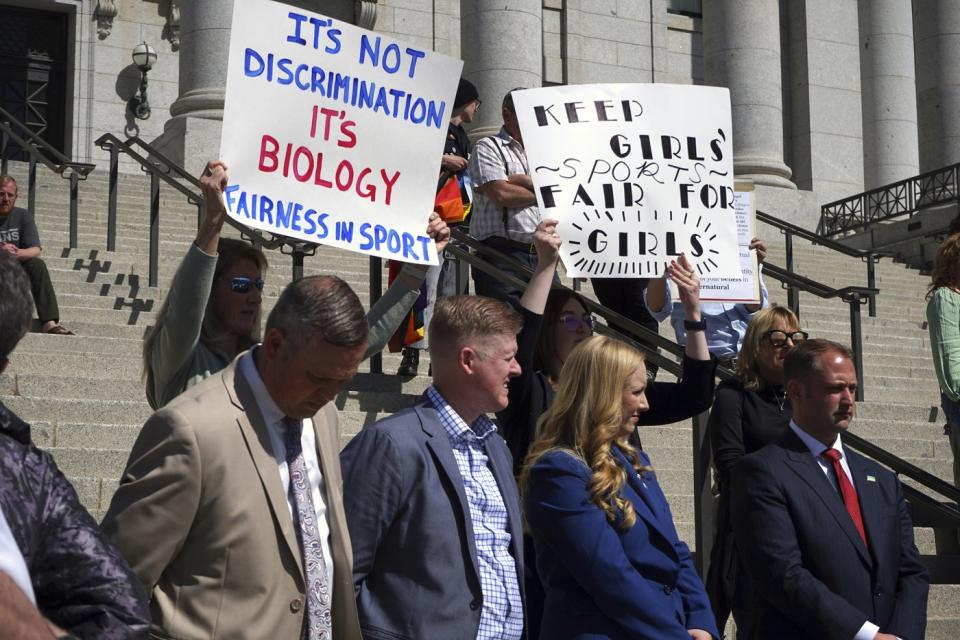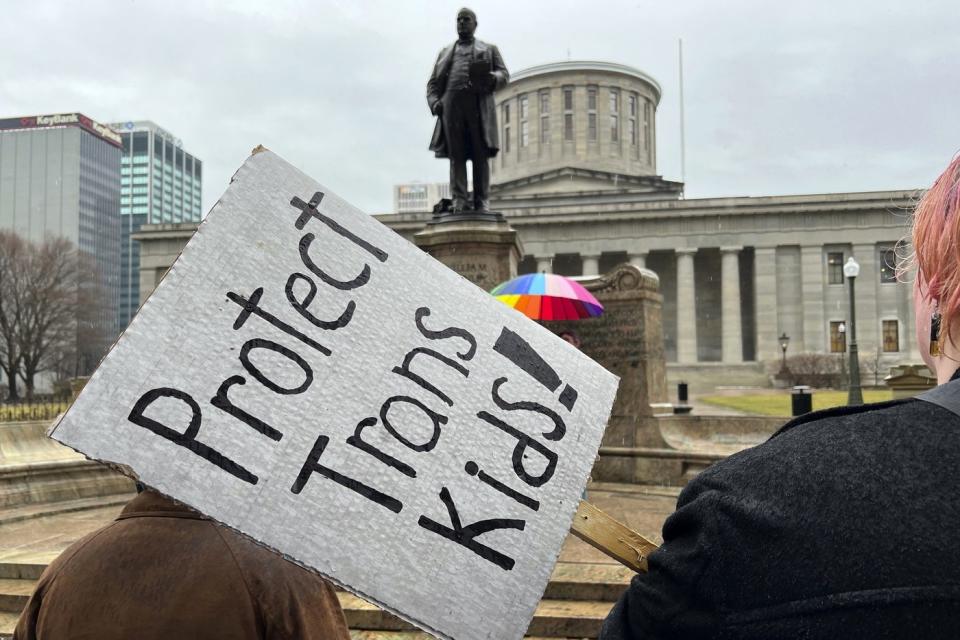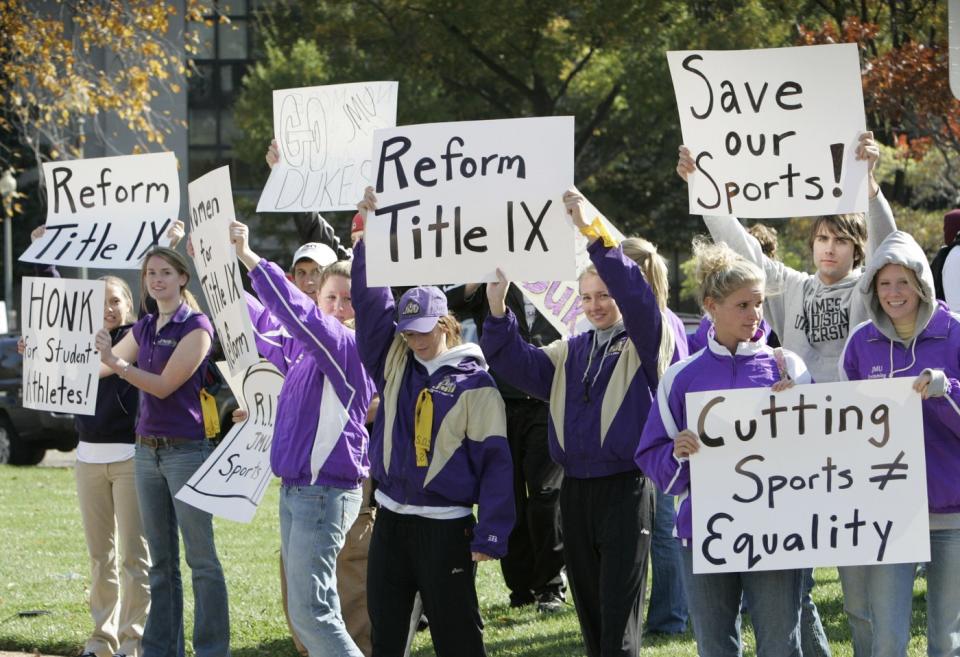Biden's Title IX law expanding protections for LGBTQ+ students is dealt another setback
FRANKFORT, Ky. (AP) — The Biden administration's effort to expand protections for LGBTQ+ students hit another roadblock Monday, when a federal judge in Kentucky temporarily blocked the new Title IX rule in six additional states.
U.S. District Judge Danny C. Reeves referred to the regulation as “arbitrary in the truest sense of the word” in granting a preliminary injunction blocking it in Kentucky, Indiana, Ohio, Tennessee, Virginia and West Virginia. His ruling comes days after a different federal judge temporarily blocked the new rule from taking effect in Idaho, Louisiana, Mississippi and Montana.
Attorneys general in more than 20 Republican-led states have filed at least seven legal challenges to President Joe Biden's new policy. Republicans argue the policy is a ruse to allow transgender girls to play on girls athletic teams. The Biden administration said the rule does not apply to athletics.
Still under consideration is a request for a preliminary injunction filed by the Republican attorneys general of Arkansas, Iowa, Missouri, Nebraska, North Dakota and South Dakota. The Education Department has asked a judge to deny the request.
Set to take hold in August, the rule expands Title IX civil rights protections to LGBTQ+ students, expands the definition of sexual harassment at schools and colleges, and adds safeguards for victims. Title IX, passed in 1972, is a law that bars sex discrimination in education.
The ruling Monday in Kentucky was applauded by the state’s Republican attorney general, Russell Coleman, who said the regulation would undermine equal opportunities for women.
“The judge’s order makes clear that the U.S. Department of Education’s attempt to redefine ‘sex’ to include ‘gender identity’ is unlawful and beyond the agency’s regulatory authority,” Coleman said in a statement.
The Education Department said it would "continue to fight for every student” as it reviews the ruling.
“Title IX guarantees that no person experience sex discrimination in a federally funded educational environment,” the agency said in a statement. “The department crafted the final Title IX regulations following a rigorous process."
In his ruling, Reeves noted that Title IX was intended to “level the playing field” between men and women in education but said the department was seeking to “derail deeply rooted law” with the new policy.
“At bottom, the department would turn Title IX on its head by redefining ‘sex’ to include ‘gender identity,’” he said. “But ‘sex’ and ‘gender identity’ do not mean the same thing. The department’s interpretation conflicts with the plain language of Title IX and therefore exceeds its authority to promulgate regulations under that statute.”
At a minimum, students of both sexes would “experience violations of their bodily privacy by students of a different sex” if the rule took effect, the judge said.
The rule would mandate that schools “permit biological men into women’s intimate spaces, and women into men’s, within the educational environment based entirely on a person’s subjective gender identity,” he said. “This result is not only impossible to square with Title IX but with the broader guarantee of education protection for all students.”
The new rule also has “serious First Amendment implications,” the judge said.
“The rule includes a new definition of sexual harassment which may require educators to use pronouns consistent with a student’s purported gender identity rather than their biological sex,” Reeves wrote. “Based on the ‘pervasive’ nature of pronoun usage in everyday life, educators likely would be required to use students’ preferred pronouns regardless of whether doing so conflicts with the educator’s religious or moral beliefs. A rule that compels speech and engages in such viewpoint discrimination is impermissible.”
The ruling by Reeves, who was appointed to the federal bench by Republican President George W. Bush, was the latest setback for the new protections, which were praised by civil rights advocates but drew backlash from opponents who say they undermine the spirit of Title IX.
The decision was blasted by the Fairness Campaign, a Kentucky-based LGBTQ+ advocacy group. Chris Hartman, its executive director, said the ruling “ignores basic truths about the transgender community and further places in the crosshairs transgender kids, who are among our smallest and most vulnerable populations.”
David Walls, executive director of The Family Foundation, a socially conservative, “faith-based” public policy organization in Kentucky, praised the judge for temporarily halting the Biden administration’s “radical redefinition of ‘sex’ that would reverse opportunities that women and girls have enjoyed for 50 years under Title IX.”
Several GOP states have laws forbidding transgender girls from competing on girls sports teams. Those states argue that the new policy would open the door to allowing it. The Biden administration has proposed a separate rule that would forbid such blanket bans, but said the newly finalized rule does not apply to athletics.
___
Associated Press writer Andrew DeMillo in Little Rock, Arkansas, contributed to this report.
Bruce Schreiner, The Associated Press



